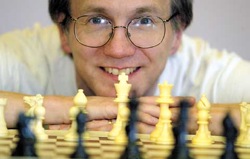Thanks to my blog readers for all their helpful comments on my last post. Especially I’d like to give credit to Todd Bryant, who figured out that my 60th move against Bryon Doyle was just fine. In fact, 60. Rxh6 is the most natural move there, and several people said that they would also have played it and maybe not even looked at 60. Rf5+. I still think that 60. Rf5+ would win with a nice flourish, but my gut instinct to play 60. Rxh6 was not mistaken. It was my massive time-trouble breakdown/panic attack afterward that was to blame for the draw.
Craig Mar says that to stay above 2200, you have to study endgames. He may be right.
Strangely, almost everybody who is a Facebook friend of mine had a bad weekend at the chess board. Uyanga Byambaa, who beat me in round three, nevertheless had a disaster in round six when she hung a queen in a probably winning position. Michael Aigner played only one game and had to withdraw for health reasons. Elliott Winslow wrote an anguished Facebook post the night before the tournament about a disaster in his love life, and not surprisingly he was in no shape to play. He lost a couple games and withdrew. The curse even extended to people playing in other tournaments. Simon Rubinstein-Salzedo went +1 -4 = 1 in the southern California championship. Mike Zaloznyy, playing in Nevada, said he had his worst tournament of the year. Even Jason Cigan up in Oregon, who has been on a roll this year, had a setback last weekend. If misery loves company, I’ve got a lot of it.
The results of the northern California championship have now been posted. Obviously somebody had to win, and in this case it was two of the grandmasters: Daniel Naroditsky and Ioan Chirila, who scored 5-1. Congratulations to them, especially to Danya who was playing only ten minutes away from home! I like to see the home boys defending the honor of California.
Among the younger players, Cameron Wheeler and Rayan Taghizadeh had fantastic tournaments with 4½-1½ scores. Cameron had a big advantage against Naroditsky in their game, when Naroditsky employed the “grandmaster defense.” (Offer a draw to your opponent. This works especially well when you are rated 300-400 points higher or when you are a GM.) As for Taghizadeh, not only did he beat GM Kraai as I wrote in my last post, he drew GM Chirila and actually went into the last round in clear first place. However, he lost to Naroditsky and dropped to third.
And now for the ratings. Lots of sad faces here … 🙁 🙁 🙁
Me: 2203 –> 2179
Uyanga Byambaa: 2204 –> 2196
Ladia Jirasek: 2221 –> 2194
Getting over 2200 isn’t the hardest thing. Staying over 2200 is harder! Study those endgames. And don’t … don’t … don’t let yourself get into time pressure!



{ 1 comment… read it below or add one }
I’m afraid I contributed to Jason Cigan’s bad weekend :-<
After managing to lose my Monday morning game in 17 moves, I hung out with the parents of various young players in the lounge, and we talked about how to handle losing. It's not only young players who struggle with this. I quit chess in '87 in large part because I'd become obsessed with rating and the "burden" of having a 2100 rating and therefore expecting myself to consistently beat experts and A-players was too high. I hope I'm doing better now.
The parent comment I liked best was "So you're a super-GM and you walk into the room for the first round of the Sinquefield. You're one of the very best players in the world! But it's 50/50 that you'll walk out of that room having lost your game [all games were decisive that round]. So you'd better just learn to deal with it."